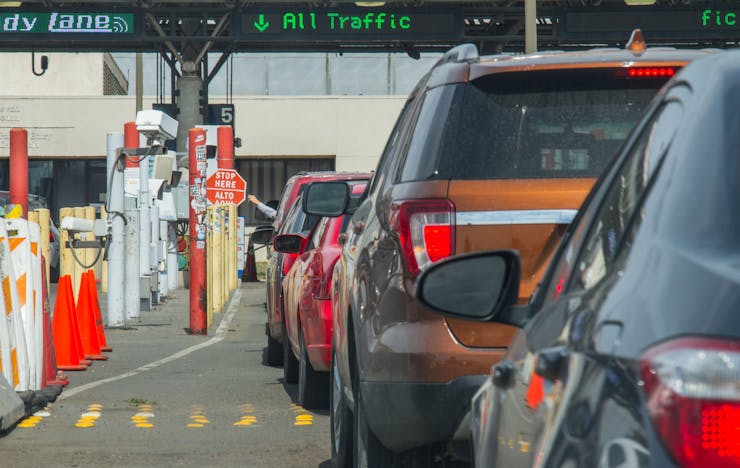The United States government has begun evolving its confused policy toward cannabis. On October 9, the US Customs and Border Protection agency (CPB, part of Homeland Security) announced that Canadians “working in or facilitating the proliferation of the legal marijuana industry in Canada” will be admissible for entry into the US as long as the reason for their visit is not related to the cannabis industry.
The announcement marks a stark shift in US federal policy, led by embattled staunchly anti-cannabis Attorney General Jeff Sessions, which had issued a media release on September 21 that read: “As marijuana continues to be a controlled substance under United States law, working in or facilitating the proliferation of the legal marijuana industry in US states where it is deemed legal or Canada may affect admissibility to the US” Border patrol officers had been informed of the policy and were expected to act on it.
Blaine, Washington, lawyer Len Saunders—an expert in both cannabis and border-crossing cases—told Leafly that he feels the “American application of federal marijuana laws is hypocritical.” He points out that recreational cannabis use is legal in Washington and will soon be legal in British Columbia; but will continue to be punished at the border. “They hand off domestic policy to the states,” he said, “but use the full force of the law at the border.”
That’s especially important for Canadians who work or invest in the legal cannabis industry. In a September interview with Politico, Todd Owen, executive assistant commissioner for CBP’s Office of Field Operations said of the cannabis industry that “we don’t recognize that as a legal business” and warned of a “lifetime ban” for Canadians who have admitted to or lied about their prior drug use as well as involvement in the legal cannabis industry.
Saunders points out that the Canadian government has put its citizens at risk by telling them to be open and not to lie about cannabis use, employment or investment at the border. He doesn’t want Canadians to lie at the border, which can result in a lifetime ban, but he warns them not to be very forthcoming, either. “It’s legal here, it’s going to be legal up there, so people get caught off guard,” he said. “Thinking it’s safe to answer yes, they do and get into trouble.” His advice is to politely refuse to answer the question and try again later if refused entry.
Prime Minister Justin Trudeau was recently asked on a radio talk show what to do if an American border patrol agent asks about cannabis use or employment. His answer was “to reflect before answering.” Saunders said that response was “ridiculous,” and pointed out that Trudeau, an admitted cannabis user, could be barred from entry to the US after his diplomatic visa expires. So, too, he said, could be Ontario Premier Doug Ford. Although he has not admitted to cannabis use, by leading an Ontario government that will administer legal cannabis sales, he is guilty of aiding and abetting the proliferation of the industry.
The federal policy turnaround represents a departure from the hardline tack of the current administration. Several states, the District of Columbia and many cities outside those states have legalized recreational cannabis use and most of the others have decriminalized it. Other jurisdictions, like New York City, have left the old laws on the books and just decided not to enforce them. Only three states — Idaho, Nebraska and South Dakota — representing less than 1.4 percent of the US population, have not legalized some form of medicinal cannabis. Meanwhile, the federal government classifies cannabis as a Schedule 1 drug, which defines it as a dangerous, addictive drug with no medicinal benefits. That’s the same category as cocaine and heroin.
Unable or unwilling to prosecute cannabis users within those states, the federal government has turned its attention to those they believe are moving cannabis, legal or otherwise, between state lines or over international borders, even if it’s legal on both sides.
While several people have reported being turned away from the border and even being given lifetime bans, several prominent Canadians in the industry who visit the US frequently—including Will Stewart, vice-president of corporate communications for Hiku—told Leafly’s Randi Druzin that they have not heard of any of their colleagues having any trouble at the border.
Saunders said he considers any US policy that turn Canadians away from entry because of cannabis use, employment or investment to be counter-productive. “If it’s legal on both sides and an estimated 40 percent of adults use it, you’re cutting out millions of Canadians,” he said. “And without Canadians coming in for gas and other products, towns like Blaine would die.”
The reasons for the sudden policy change are unclear, but more changes could be coming soon. Even under the new policy, representatives of Canadian cannabis companies would be forbidden to do business with their American counterparts in person. Saunders acknowledges that such a policy would not only hamper business in both countries, but also could be in violation of NAFTA or other trade agreements.
The confusion won’t end, Saunders said, until there is a harmonization between US federal and state policies. “With Donald Trump—who doesn’t even drink—in office,” he said. “It won’t happen soon.”
And with US entry ban waivers costing $585 (US) plus legal fees, the only people benefitting are Saunders and his colleagues in the legal business.





